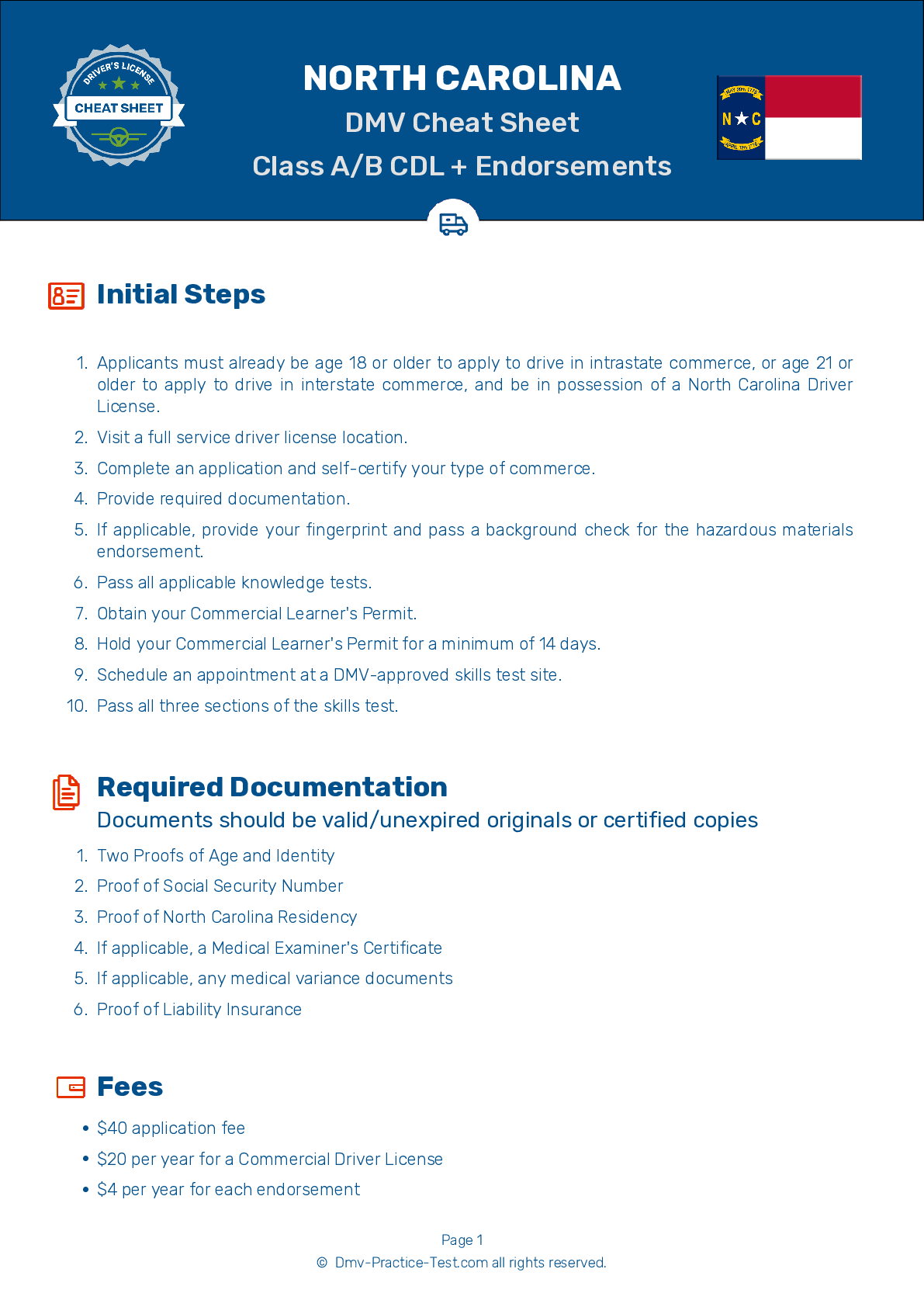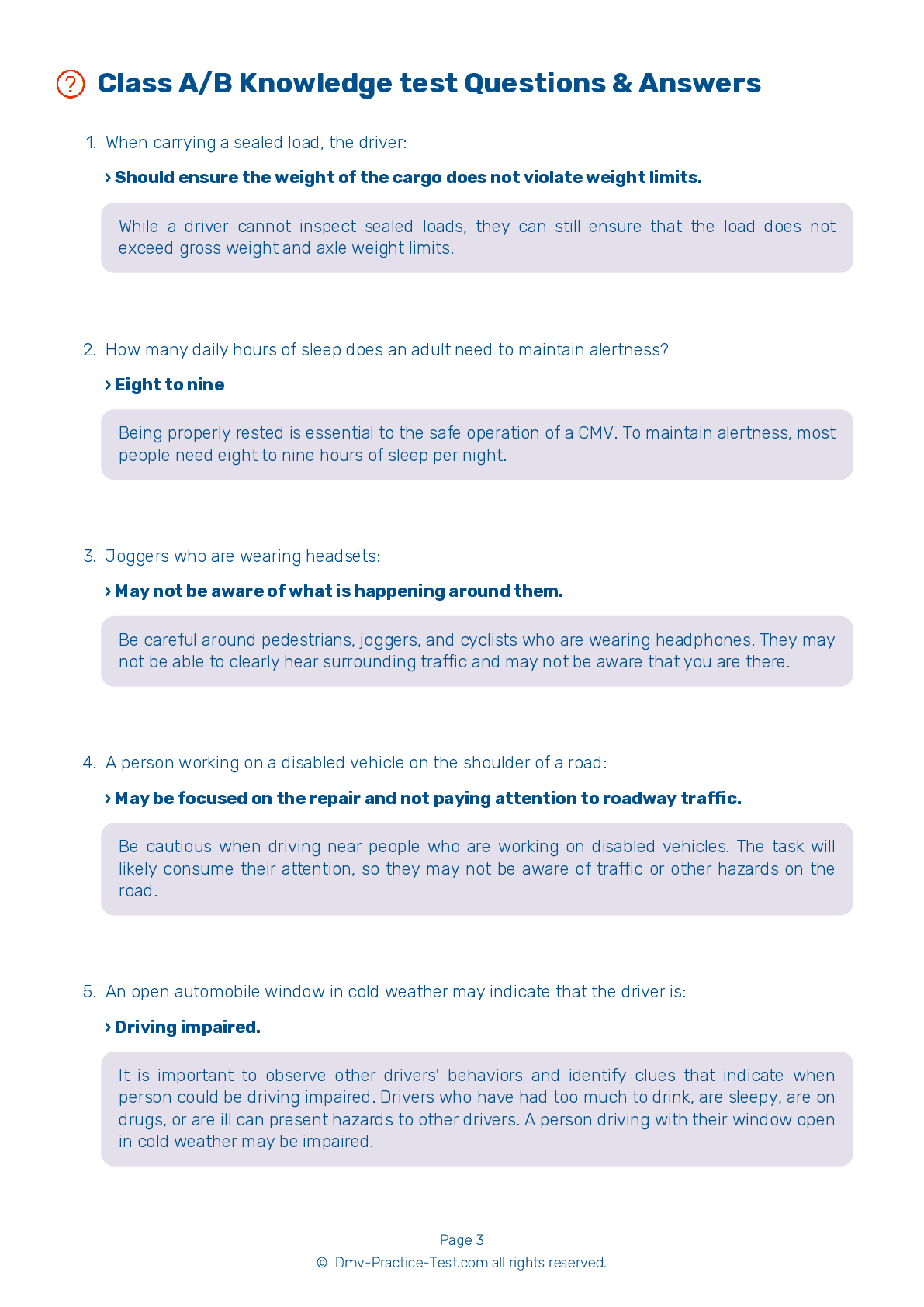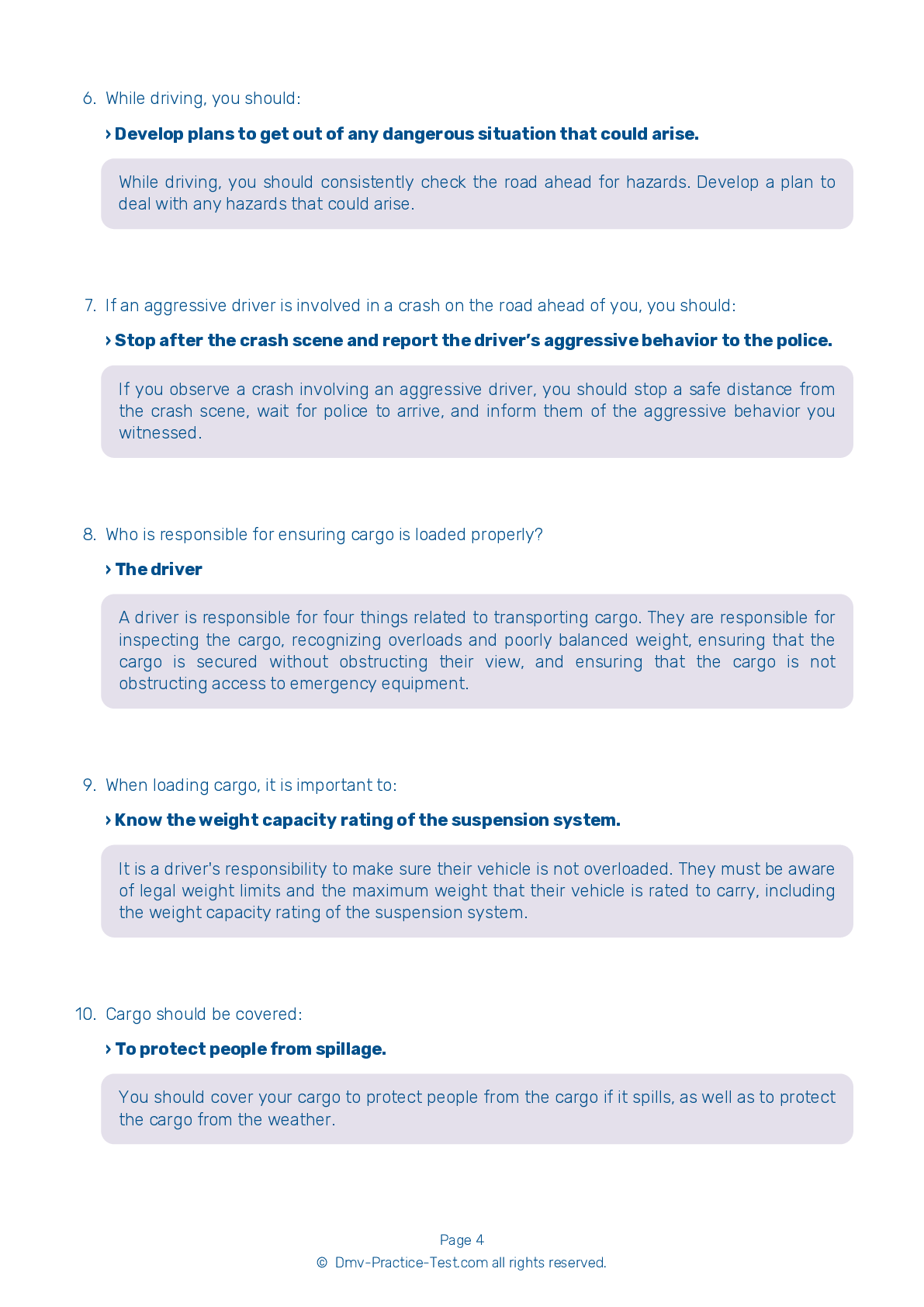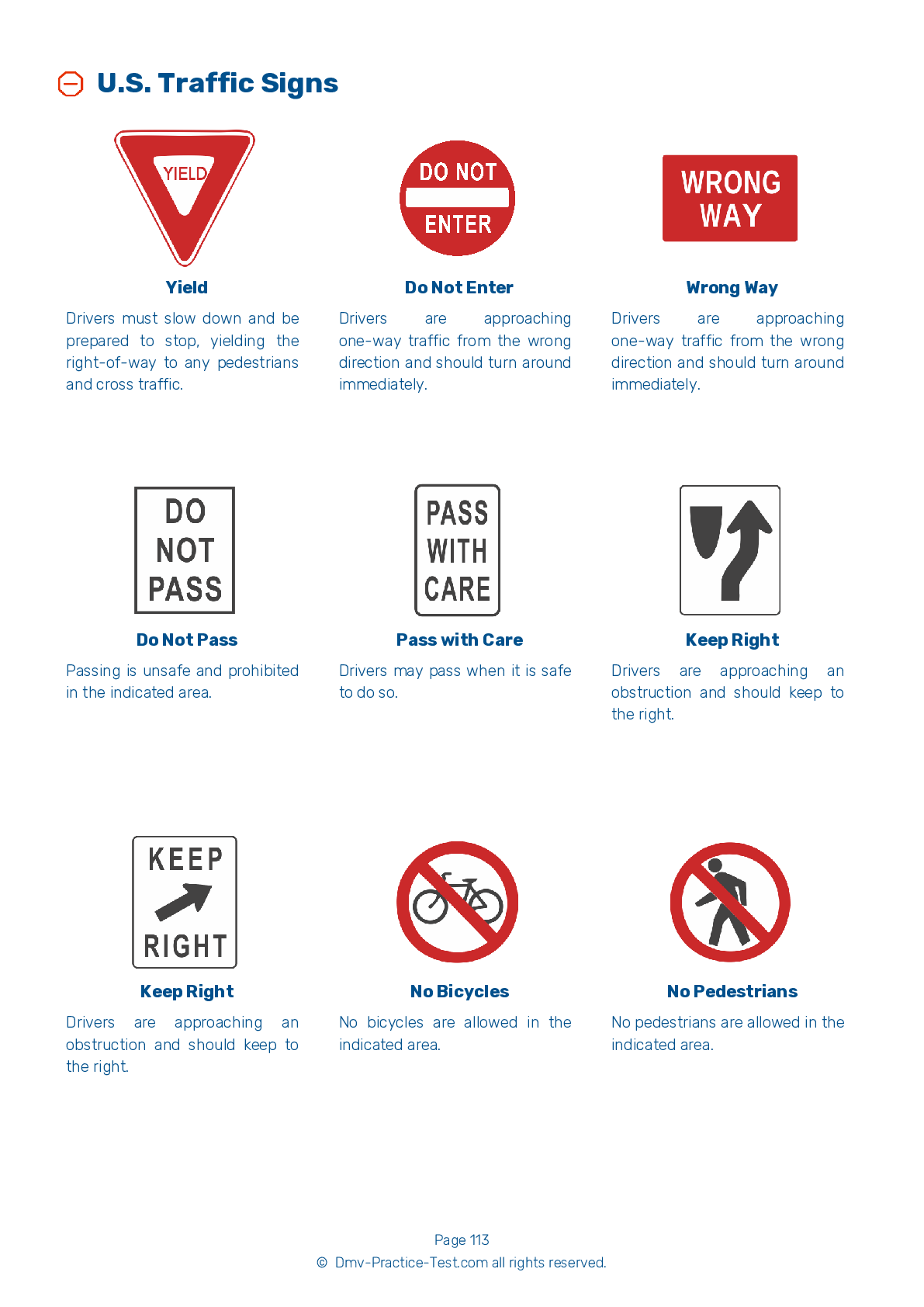Knowledge Test Class A #1
Class A Driving Test | North Carolina 2026 #1 Page 6 of 7
Train for FREE online with our North Carolina class A license test. The official exam test consists of several obligatory parts, with all of them checking your knowledge of different blocks of road rules. If you need to obtain a NC CDL class A permit in 2026, practice as much as possible. Free sample tests published on our website will help you check and improve your knowledge and boost your grades. Please bear in mind that CDL class A requirements may vary from state to state.
50
40
20
36 . If the low air pressure warning signal comes on in a vehicle with air brakes, the driver should:
If the low air pressure warning signal comes on while you are operating a vehicle with air brakes, you should stop and safely park the vehicle as soon as possible. It is essential that you are able to stop safely while you still have some braking power remaining.
37 . In a dual air brake system, if one air system is very low on pressure:
In a dual air brake system, either the front or rear brakes will not be fully operable if one of the air systems gets too low on pressure. If the air pressure in either tank gets too low while you are driving, you should exit the road and park as soon as possible.
38 . When taking the basic control skills test, drivers are:
Allowed to leave the vehicle, but only if the vehicle is placed in neutral and the parking brake is set.
During the basic vehicle control skills test, you must place the vehicle in neutral and set the parking brake before exiting the vehicle to check its position. You may check the position of the vehicle no more than twice, except during the straight line backing exercise, where you may look no more than once.
39 . Before beginning downhill, you should:
Rely only on braking to reduce your speed.
On a steep downgrade, you must use the engine's braking effect as your primary method of speed control. Be sure to decelerate and downshift appropriately before beginning to drive down the hill. Relying too heavily on the brakes may cause them to overheat and fade, becoming less effective.
40 . Cargo inside a trailer:
Should be loaded with the heaviest items on top of lighter items.
Cargo needs to be secured appropriately to prevent it from moving in transit. Cargo should be arranged to keep the vehicle's center of gravity low and well-distributed.
41 . When backing up, follow a turning trailer by:
When backing with a trailer, begin by turning the steering wheel in the direction opposite of the turn. Once the trailer starts to turn, reverse the direction of the steering wheel to follow the trailer.
42 . When making a turn, when should you cancel your turn signal?
It does not matter.
When turning or changing lanes, you should signal early and signal continuously. Cancel your turn signal once the turn or lane change is complete.
2026 North Carolina | Frequently Asked Questions
A CDL Class B license in North Carolina permits the holder to operate commercial vehicles weighing more than 26,000 pounds and towing vehicles not exceeding 10,000 pounds. This includes buses, farm labor vehicles, and any vehicle designed to transport 24 passengers or more, including the driver. Endorsements may be required for certain vehicles.
A Class B CDL license in North Carolina allows you to operate single or combination vehicles where the single vehicle weighs over 26,000 pounds. This includes straight trucks, large buses, segmented buses, box trucks, dump trucks with small trailers, and any vehicle designed to transport 24 passengers or more including the driver.
To acquire a Class B CDL license in North Carolina, you must be at least 18 years old (21 for interstate driving), possess a valid North Carolina driver's license, pass a DOT medical examination, successfully complete the CDL general knowledge test, and pass the skills test in the type of vehicle you plan to drive. A clean driving record is also essential.
In North Carolina, to qualify for a Class B CDL license, you must be at least 18 years old for intrastate transportation (within state lines) and at least 21 years old for interstate transportation (across state lines). Additionally, you must pass a medical examination and have a clean driving record.
Specific endorsements aren't necessary for a Class B CDL license in North Carolina but may be required based on the type of vehicle you plan to drive or cargo you're transporting. For example, you'd need a Passenger (P) endorsement to drive a bus or a Hazardous Materials (H) endorsement to transport HazMat. Each endorsement requires additional testing.
The Class B CDL skills assessment in North Carolina includes a pre-trip vehicle inspection, a basic vehicle control test, and an on-road driving test. You'll need to demonstrate your ability to inspect your vehicle, control it in different situations, and drive it safely on the road, following all traffic rules and regulations.
Yes, Class B CDL license holders in North Carolina are limited to operating vehicles with a GVWR of 26,001 pounds or more, or any such vehicle towing a vehicle not in excess of 10,000 pounds GVWR. They can't drive a combination of vehicles (like a tractor-trailer) that would require a Class A CDL. Also, additional endorsements may be needed for certain types of vehicles or cargo.
No, North Carolina does not offer the written Class B CDL test in languages other than English. This is due to Federal Motor Carrier Safety Regulations which require drivers to read and speak English sufficiently to converse with the general public, understand highway traffic signs and signals, respond to official inquiries, and make entries on reports and records.
Yes, you can request accommodations for the Class B CDL written exam in North Carolina due to disability. The Division of Motor Vehicles is committed to ensuring that its services are accessible. However, you must provide proper documentation of your disability and specify the type of accommodation needed. Contact your local DMV office for detailed information.
Yes, if you fail the Class B CDL written test in North Carolina, you can retake it. However, you must wait at least 5 days between attempts. There is no limit to the number of times you can retake the test, but each attempt requires a new fee. It's recommended to study thoroughly before retaking the test.



